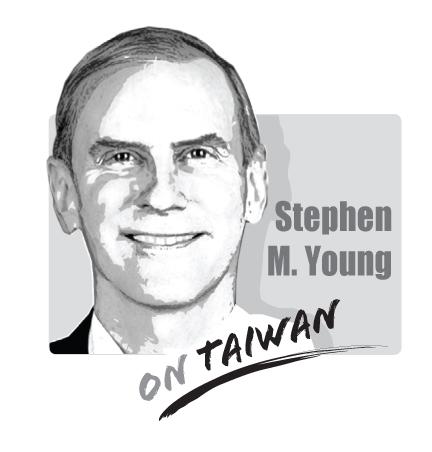Having spent a diplomatic career working on Russia/USSR and Taiwan/China, I have followed events in those regions closely for more than fifty years. Early on, I expended countless brain cells obtaining spoken and written proficiency in Russian and Chinese. Therefore, I feel I must speak out now on Vladimir Putin’s reckless invasion of Ukraine and what it means for Asia.
There is cause for grave concern, but also reason not to go overboard on the comparison between what is currently unfolding in Ukraine and Taiwan’s situation. Putin’s reckless adventurism caught the world by surprise, but we might have seen this coming. Vladimir Putin belongs to a class of Russians who have long bemoaned the collapse of the Soviet Union, with its domination of a vast territory from the plains of Europe to the Pacific Ocean. Many of them like to blame Gorbachev and Yeltsin for this supposed tragedy, though the seeds of the dissolution of the USSR run deep. The strong nationalist, cultural and geopolitical roots of the collapse of the USSR were there over thirty years ago.
Most of the world embraced the transformation of the Soviet Union into fifteen independent and separate young nations, thankful that all this occurred largely without violence or upheaval. But some, including a restless young KGB agent named Vladimir Putin, brooded over the seeming loss of Soviet greatness. The result was the shocking — at least to much of the world — invasion of Ukraine by Russian military forces a few days ago. As I write this, the battle rages on, with the Ukrainians putting up surprisingly effective resistance to the superior military might of Moscow.

Meanwhile, the world has reacted with admirable unity in opposing Putin’s power grab. The basket of political and economic sanctions being rolled out against Russia is having immediate and serious consequences for the Russian Federation’s already fragile standing. The impact will only increase over time. In short, Putin has badly miscalculated, and in my opinion will ultimately fail in his revanchist ambitions. Whether this will result in his removal from power is up to the Russian people, but I believe it is a real possibility.
A word about Beijing’s reaction. Some accounts suggest Putin shared his plans with President Xi (習近平) when they met on the margins of the Winter Olympics in China. If Putin didn’t alert Xi to his plans, Mr. Xi has the right to be offended by his authoritarian partner for being surprised, just as Beijing completed its hosting of the winter Olympics. This is not how strategic partners are supposed to behave. But Putin has long shown a disdain for traditional values, and so I would not be that surprised if he failed to warn Xi of his plans in advance. If Putin did give Xi advance warning, I would hope the Chinese strongman cautioned his northern neighbor of the inherent risks. We may never know all the details.
To the question now: Does Putin’s invasion of Ukraine increase the danger of an early attempt by Beijing to launch an invasion against Taiwan? I tend to doubt it, though not with thorough confidence. Xi is approaching a key moment in his political ambitions, as he hopes to extend his rule into a third five-year term at this fall’s Party Congress. That would break with a decades-long practice of limited terms, and in essence make Xi — like Putin — leader for life. In connection with this ambition, there is no urgent necessity for Xi to roll the dice and gamble all his marbles on an attempt to use military force to compel Taiwan’s subjugation.
Let me start with the challenges. First, a military assault on Taiwan from mainland China poses considerably greater challenges than what Putin has faced thus far in his attack on Ukraine. There is the far from trivial matter of crossing nearly one hundred miles of open water, successfully establishing a beachhead on Taiwan, and then consolidating that by moving its forces inland and subduing Taiwan military resistance. Second, unlike in Ukraine, any Chinese attempt to attack Taiwan faces the real possibility of American military involvement, in addition to the probability that other US allies, including Australia and Japan, may also join in the fight. Third, I would contend that Taiwan’s military is much more prepared to counter any such attack than Ukraine was. By stating this, I am focusing not only on the readiness of the Taiwan military, but also its network of friends in the region.
It grieves me to discuss this, because I firmly believe any military adventure by Beijing against Taiwan would be a tragedy for all concerned, and could plunge East Asia into troubled waters for a long time to come. Taiwan, by dint of its remarkable and vibrant economy, is a key player in both regional and global economics. The island’s dominance of the high tech market, highlighted by companies like Morris Chang’s (張忠謀) TSMC and Stan Shih’s (施振榮) ACER’s global standing, is a case in point. Any disruption of chip manufacturing would quickly ripple throughout the world, dependent as we all are on the state-of-art microchips and computers that power so much of our world; including this laptop on which I am writing here.
I also think Mr. Xi could seriously jeopardize his ability to extend his reign as China’s kingpin if he gambled on a Taiwan adventure. He is already on thin ice, as he seeks to lengthen his rule indefinitely at the fall Party Congress. Those who facilitated Xi’s rise to power must have serious misgivings about his ambitions. After all, it is they who elevated him to power back in 2012. I have little doubt that several of them harbor ambitions for the top job themselves. Xi’s gamble therefore runs the real risk of failure, which could lead to his being deposed in a palace coup.
In sum, as a longtime student of both Russian and Chinese politics, I think the near-term chances that Beijing’s risk-averse leaders would gamble on launching an unprovoked attack on Taiwan are not high. Meanwhile, all eyes remain on Ukraine, and its valiant effort to thwart Russian conquest. The stakes for security in Europe couldn’t be higher. My thoughts are with the people of Ukraine, and I hope this unwarranted and unwanted crisis can quickly be resolved without further bloodshed and suffering. If this leads to Putin’s fall, all the better.
Ambassador Stephen M. Young (ret.) lived in Kaohsiung as a boy over 50 years ago, and served in AIT four times: as a young consular officer (1981-’82), as a language student (1989-’90), as Deputy Director (1998-2001) and as Director (2006-’9). He visits often and writes regularly about Taiwan matters. Young was also US Ambassador to Kyrgyzstan and Consul General to Hong Kong during his 33-year career as a foreign service officer. He has a BA from Wesleyan University and a PhD from the University of Chicago.
During the long Lunar New Year’s holiday, Taiwan has shown several positive developments in different aspects of society, hinting at a hopeful outlook for the Year of the Horse, but there are also significant challenges that the country must cautiously navigate with strength, wisdom and resilience. Before the holiday break, Taiwan’s stock market closed at a record 10,080.3 points and the TAIEX wrapped up at a record-high 33,605.71 points, while Taipei and Washington formally signed the Taiwan-US Agreement on Reciprocal Trade that caps US tariffs on Taiwanese goods at 15 percent and secures Taiwan preferential tariff treatment. President William Lai (賴清德) in
Chinese Nationalist Party (KMT) Deputy Chairman Hsiao Hsu-tsen (蕭旭岑) earlier this month led a delegation to Beijing to attend a think tank forum between the KMT and Chinese Communist Party (CCP). After returning to Taiwan, Hsiao spoke at length about “accumulating mutual trust” and letting matters “fall into place,” portraying the forum as a series of discussions focused on cooperation in tourism, renewable energy, disaster prevention, emerging industries, health and medicine, and artificial intelligence (AI). However, when the entire dialogue presupposes the so-called “1992 consensus — the idea that there is only “one China,” with each side of the Taiwan
As red lanterns adorn street corners and social media feeds teem with zodiac divinations, the Year of the Horse has arrived. In our hyper-accelerated age, the horse is almost exclusively synonymous with the idiom ma dao cheng gong (馬到成功) — “instant success upon arrival.” It is a linguistic shot of adrenaline, fueling the thrilling illusion that once the bell tolls, our lives would screech off into a cloud of dust, leaving all troubles behind. Yet, when examining the millennia-long partnership between humans and this magnificent “biological machine,” a different truth emerges. The true essence of the horse is not merely speed;

India is getting richer every year, but its cities do not seem to be getting any more livable. Not because the country is too poor, or because leaders lack ambition, but because urban citizens are starved of funds and deprived of representation — and the government is in no hurry to fix it, even though people are dying as a result. Mumbai’s skyline is dotted with opulent glass towers, and it calls itself India’s commercial capital. The civic body, the Brihanmumbai Municipal Corp, is the country’s richest. Yet, residents have lived for years with no say in how their city was